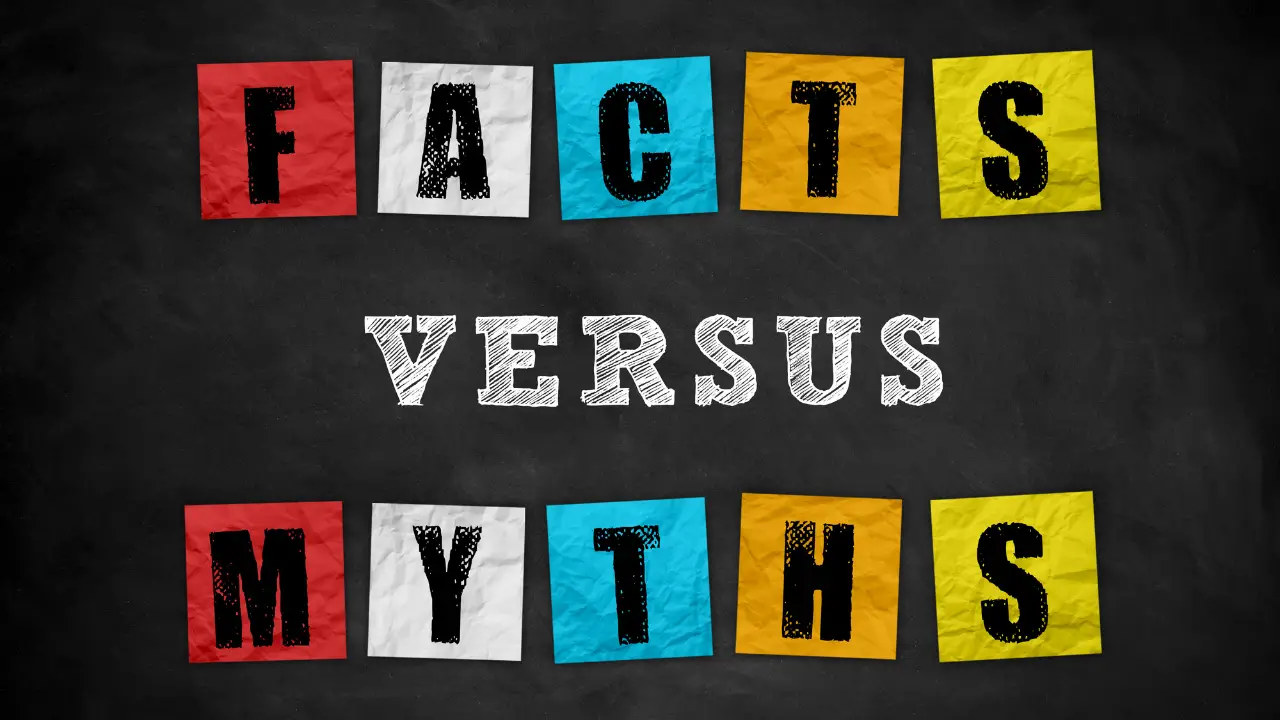Anymore, most people are aware of, or at least have heard about gluten or the gluten-free diet, even amongst those who can tolerate gluten. In this day and age, when something becomes this hot a topic of discussion, rumors and myths start to spread about it.
When people start sharing their opinions on social media platforms. And don't research them or consulting an expert, these opinions can gather a large audience. Similarly, a myth can spread like wildfire once it gets distributed through the internet.
Some people believe these rumors without checking the credibility and play their part in further spreading them by reaching out to anyone and everyone in their social circle. It's essential to debunk such myths since they can affect the health and well-being of people. Here are some popular myths, rumors, and untruths regarding the gluten-free diet and gluten.
A gluten-free diet is a good idea for everyone:
If your body is okay with gluten and doesn't have a problem tolerating it, then a gluten-free diet may not be what you need. Eating a gluten-free diet means you may miss out on various nutrients and can suffer from vitamin deficiencies.
Gluten-free replacements for bread and such lacks the essential fibers, which is why people complain about constipation if they switch to a gluten-free diet. Many manufactured gluten-free products are highly processed and refined. The nutrition provided by these products is not up to the mark.

Your body cannot synthesize vitamins, and there's a high chance you'll miss out on many of those, such as vitamin B complex, vitamin D, Vitamin A, and Vitamin E, by switching to a gluten-free diet. Some gluten-free processed foods have increased amounts of harmful fatty acids and increase the meal's glycemic index.
A gluten-free diet may not be for everyone. But, if a person with celiac disease or gluten sensitivity ingests gluten, it can have devastating effects on their body. Thus, to debunk the myth, a gluten-free diet is recommended for every “body!”
Gluten intolerant and Celiac disease are the same things:
Celiac disease and gluten sensitivity have almost similar symptoms. Additionally, going gluten-free can provide relief to the symptoms of both. These reasons are enough to make some people believe that celiac disease and gluten sensitivity are the same, but everything else about the two is different.

Many researchers have even suggested that gluten sensitivity isn't entirely because of gluten. Instead, it may be the fructans or amylase trypsin inhibitors, two compounds also found in wheat, rye, and barley.
Moreover, gluten sensitivity makes it difficult to diagnose it because there's no specific test for it. On the other hand, celiac disease is caused solely because of gluten, and it can get detected by conducting tests and biopsies.
There's no difference between wheat allergy and celiac disease:
We just proved the misconception that celiac disease and gluten sensitivity are the same. But there's another disease that's closely associated with celiac disease, and it's wheat allergy. Wheat allergy is a short-lived hypersensitive reaction of the body to wheat that has mild symptoms.

Alternatively, celiac disease is an autoimmune disorder in which the body reacts violently to gluten. Antibodies are potent killers of bacteria and any other harmful agent that they can act against. Imagine if James Bond went rogue. An autoimmune disorder and, in this case, celiac disease is a somewhat similar situation in which the body starts to produce rogue antibodies.
These attack gluten and ultimately end up damaging the lining of the small intestine. Celiac disease is permanent, and the symptoms are way too dangerous than a wheat allergy.
Avoiding wheat and its derivatives means you're going gluten-free:
You know by now that gluten is a protein primarily found in wheat, barley, and rye, and the first step you need to take while going gluten-free is to cut down these 3. But gluten can also be present in various other foods, especially in additives, as a hidden ingredient that people usually overlook.

Various condiments such as mayonnaise and mustard contain gluten and can prove equally harmful as any of the wheat derivatives. You might've been unaware of cheeses and preserved foods, especially those containing vinegar as another gluten source. Although pure chocolate is gluten-free, the gluten in the emulsifiers and flavoring agents might trigger your symptoms.
Celiac disease and gluten sensitivity are rare:
You can't argue statistical analysis and research, and at least 1 in every 100 people across the globe have celiac disease. According to experts, the number of diagnosed celiac disease cases is only 10-15 percent of the estimated population that suffers from the ailment. The Colombian Celiac Foundation shares the same belief, but their statistics are even higher.

According to them, the number of undiagnosed cases is ten times that of the diagnosed cases. According to recent studies, 40-50 percent of people worldwide are intolerant to gluten at some level. These numbers indicate that gluten intolerance is not rare, and if you're suffering from similar symptoms, this might be the time for you to get a diagnosis.
A little gluten won't hurt:
Oh, it'll hurt, and it'll hurt real bad. We just discussed how bad it is for someone suffering from celiac disease. A general misconception has become quite popular that patients with celiac disease can have a “cheat day,” in which they can treat themselves with gluten. Well, this isn't your bodybuilding meal plan that you can cheat on.
An intake of gluten above 20ppm can trigger your body to produce antibodies that will damage the small intestine. Before you know it, your typical symptoms of celiac disease will be back. Your small intestine recovers from the damage and heals if you go a long time without gluten.

But with slight carelessness, your health will be compromised even though you might not display the symptoms right away. You need to be very diligent if you're diagnosed with celiac disease and stay as far away from gluten as possible.
Having gluten-free ingredients means its good enough:
If you ever decide to go out to your favorite restaurant for dinner, make sure you ask them clearly to give you a gluten-free meal instead of relying on the gluten-free ingredients only. There's always a risk of cross-contamination, which is why the chef saying your meal is gluten-free is never enough.

They might use the same utensils for cooking pancakes and eggs. Therefore, many food chains only claim their ingredients to be gluten-free and not the final meal. Meanwhile, some restaurants have color-coded cooking utensils and a separate surface for their gluten-free orders.
A gluten-free diet can help lose weight:
This statement is probably the most famous myth related to a gluten-free diet and gluten, and this might break your heart if you thought it is, but a gluten-free diet never was and never will be a weight loss plan. It is solely a diet plan designed for gluten intolerant patients.
Quite to the contrary, continuous intake of gluten by an undiagnosed patient can lead to weight loss. The small intestine becomes damaged, and the body fails to absorb the necessary nutrients, and some people even gain weight after going gluten-free. When people go gluten-free, they usually have a high-nutrient and low-fat dietary intake, leading to weight loss.

If your body is okay with gluten, you can cut down your weight by following a similar diet plan without removing gluten. For this reason, going gluten-free alone should not be given all the credit for weight loss.
Eating gluten only damages the GUT:
People usually go to a doctor to get tested for celiac disease when they suffer from classic gastrointestinal symptoms such as bloating, cramps, diarrhea, vomiting, and constipation. Celiac disease is an autoimmune disorder that destroys the cells of the small intestine. And, these cells are responsible for the absorption of all the nutrients that we get after a meal.
In case of improper absorption, this can affect other parts of the body and cause some detrimental damage. For instance, decreased absorption of iron leads to abnormally low production of small immature red blood cells. The condition is called anemia which can further disrupt the normal functioning of the body. You can have periocular hyperpigmentation, or dark circles, under your eyes because of anemia.

See how gluten intake caused abnormalities under your eyes? Many people who suffered from gastrointestinal symptoms and dark circles under the eyes observed almost instant relief once they decided to go gluten-free. Gluten intake in undiagnosed celiac disease causes joint pain, fatigue, irregular periods, infertility, canker sores, and many other atypical symptoms indirectly.
Dairy does not belong in a gluten-free diet:
Many people who suffer from lactose intolerance think it's their celiac disease, and the consequential symptoms kick-starting whenever they take in dairy products. But this is not true, and dairy products, as long as they're uncontaminated, are gluten-free.
The typical symptoms of lactose intolerance are bloating, cramping, diarrhea, and stomach rumbling, so it's important not to confuse celiac disease with lactose intolerance, just like the case of wheat allergy and gluten sensitivity.

If you're lactose intolerant and don't react to gluten, you can eat all the gluten you want to, and if you're diagnosed with celiac disease instead of lactose intolerance, you don't need to worry about milk and eggs. In other words, dairy products an excellent choice for gluten-free food, contrary to the myth.
Go gluten-free the instant you notice the symptoms:
It all somehow comes down to these same lines repeatedly that celiac disease is an autoimmune disorder. Medical tests can detect the specific type of antibodies in your body with a sample of your blood. Once you're diagnosed with celiac disease, your doctor or dietitian will help you make a meal plan according to your dietary needs.

By noticing the symptoms and deciding to go gluten-free right away, you'll lose the chance of an accurate diagnosis because the antibodies will slowly decrease until they're undetectable. We just discussed how closely related the symptoms of lactose intolerance, wheat allergy, gluten sensitivity, and celiac disease are. So head to your doctor, get yourself checked, and only start a gluten-free diet after diagnosis.
Use gluten-free soaps and shampoos:
The name dermatitis herpetiformis is a skin condition characterized by blisters and itchy rashes. It is an atypical symptom of celiac disease that resides in some people. Many people feared that the gluten in soaps and shampoos is why they're getting these blisters and rashes.

You can imagine how widely this myth must've spread to record an estimated sale of 8.4 billion dollars of gluten-free soaps, shampoos, laundry detergents, and cosmetics in the year 2014 alone. Various researchers took it upon themselves to debunk this myth, and now it's a proven fact that touching gluten causes no harmful effect whatsoever, let alone dermatitis herpetiformis.
Gluten is only detrimental when ingested in amounts higher than 20ppm. Therefore, it is safe for you to use gluten-containing shampoos, soaps, laundry detergents, and cosmetics.
Going gluten-free is costly:
The gluten-free counterparts of various gluten-containing foods are no doubt more expensive. You might get two loaves of traditional bread for the price of a single gluten-free loaf. But this is only for the food items that are specially made gluten-free. By nature, many nutritious foods are gluten-free, and choosing them will undoubtedly make things easier for you financially.

We just talked about how dairy products are okay for a gluten-free diet. If, of course, you like them and tolerate them. Similarly, potatoes, rice, meat, fruits, and vegetables are an excellent economical choice for your gluten-free meal plan that will also fulfill many of your nutritional requirements.
Modern-day wheat has more gluten:
There's a popular conception that the agro-business has messed up the quality of food, especially by genetically modified Frankenfood and high fructose corn syrup. There's been a rise in the number of patients diagnosed with celiac disease.

It didn't take much imagination for gluten conspiracy theorists to formulate a myth that modern-day wheat has more gluten than the conventional varieties. But to their utmost disappointment, studies conducted in 2013 prove otherwise. The studies by Donald D. Kasarda show that no tinkering has been done with the quantity of gluten in wheat.
You can get cancer because of gluten:
Many healthy people who don't have celiac disease or gluten sensitivity gave up eating gluten when they heard the rumor that it can cause cancer. The American Institute of Cancer Research declares gluten to be devoid of any carcinogenic properties and strictly advises against giving up on them only to keep cancer at bay.

You can safely consume gluten if you're not a patient with celiac disease or gluten sensitivity, with the myth debunked. But, if you suffer from celiac or are gluten intolerant, it is safe to say the damage done to your intestines can not be healthy. Also, the GMO's and glyphosate used on wheat products could be a determining factor and not the gluten itself.
You can treat Celiac Disease through medicines:
There's almost a medication for every disease and complication in the modern world. But celiac disease is amongst those ailments that are yet untreatable. You can avoid the use of gluten to prevent the onset of symptoms. But once you eat gluten, even after 50 years of diagnosis and strictly following a gluten-free diet, you may suffer from the typical or atypical symptoms of celiac disease, which is why you can't outgrow it.

If your body is predisposed to react to gluten that way, there's nothing that you or your doctor can do about it. For now, other than be cautious and not trigger the symptoms by eating a completely gluten-free diet.
Gluten causes IBS:
Like various other diseases and conditions, IBS is also closely associated with gluten and celiac disease. Many people believe that gluten triggers the symptoms of IBS. Instead, a high FODMAP diet is to blame for IBS symptoms. But the thing is, many of the food sources that are high in FODMAP also tend to be a source of gluten.

So when you cut down these sources thinking you're going gluten-free you're, actually removing FODMAP from your diet. This myth was ruled out to be false when eating gluten-containing food low in FODMAP. Food has more of an effect on our body than we realize.
Rice, potato, and oats contain gluten:
Not all grains are culprits for containing gluten. Many individuals falsely blame rice and oats for being a source of gluten. Cross-contamination in the fields or during processing and packaging may lead to them becoming a source, but rice, oats, and potatoes are naturally gluten-free. Again, cross-contamination is to blame.
Going gluten-free means you can't have a balanced, tasty meal every day.
Anyone with celiac disease or gluten sensitivity needs to avoid any and every source of gluten. While doing so, you might miss out on many nutrients if you don't plan a diet smartly. Consult a nutritionist or a dietitian, and ask them to help you make a meal plan that'll not only cover your nutritional requirements. They will consist of tasty, delicious meals.

Numerous gluten-free recipes simulate gluten-containing dishes. Even if you don't consider these recipes, you can still have various naturally gluten-free foods. For breakfast, toss an egg-white omelet with vegetables and low-fat cheese. For lunch, devour lemon artichoke chicken with asparagus. Dinner may consist of corn tortilla tacos or rice noodles with tofu.
Celiac disease and Gluten Sensitivity are a myth:
We left the most bizarre myth for the end that celiac disease and gluten sensitivity are themselves a myth. If you're a patient with either of these, don't let this upset you. There's enough clinical and medical evidence, along with statistical analysis and research, to debunk this myth. Gluten, celiac disease, and gluten sensitivity aren't a facade, a myth, or a misconception. Those who suffer know that they are ver real.
Final Thoughts
Always do your research and attain accurate facts before you believe anything. Consult a professional to get better guidance every step of the way when you venture into a gluten-free life.






